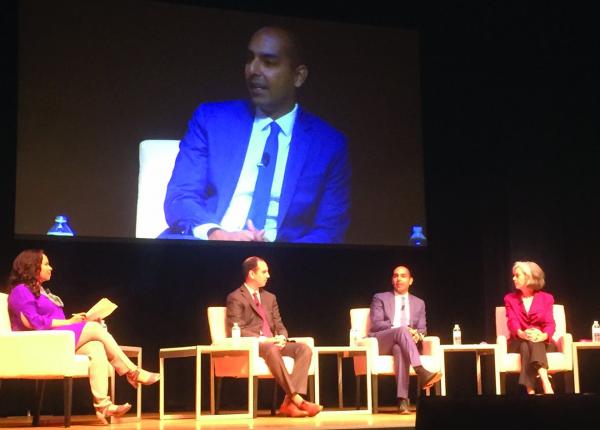September 27, 2018

Democratic House nominee Dr. Jon Santiago talked Thursday morning on a panel about state and federal response to the opioid epidemic moderated by WBZ-TV medical reporter Dr. Mallika Marshall.
Colin A. Young/SHNS photo
Dr. Jon Santiago makes the daily walk down Massachusetts Avenue to his job as an emergency medicine doctor at Boston Medical Center, traversing an area that’s become known for its concentration of people in the throes of addiction and seeking treatment.
Santiago, a Democrat who unseated Rep. Byron Rushing to represent Boston’s Back Bay and South End in the Massachusetts House next session, said the things he sees on his walk pushed him to run for office and fight the opioid epidemic as a lawmaker.
“I was concerned about not just my quality of life and what I experience on my walk every day, but what my patients were going through,” Santiago said Thursday at a conference convened by Williams James College to take stock of the state and federal response to the ongoing opioid epidemic. “This really is the public health crisis of our generation and there is not a day that goes by that I don’t take care of someone in the throes addiction. I worked a shift last night and I’m working one tonight as well, and I guarantee you I will take care of someone in the throes of addiction.”
Santiago said he wants to see the Legislature continue its work on addiction prevention and treatment by pouring money into strategies that have been proven successful and constantly searching for new ways to open doors to treatment and prevent addiction in the first place.
“When I look at how we address the opioid epidemic at the state level, we need to double down on what we know works, we have to be bold and innovative and we have to act with urgency,” he said.
Santiago said he wants to incorporate Suboxone medication-assisted treatment (MAT) into the primary care system and will advocate making MAT available at all state prisons and jails, not just the five recently approved for a pilot program.
“It has so much more to go, in terms of how we treat vulnerable communities, particularly those who are in jail,” Santiago said of the opioid legislation passed at the end of July. “For me, as someone who takes care of patients and people who have been incarcerated ... the fact that we’re piloting just at five county jails is really concerning to me.”
He added, “We should be treating this like we treat diabetes, high blood pressure and that sort of thing. And that’s one thing I’m going to be advocating for.”
Santiago, who does not have an opponent on the November ballot, also voiced support for additional research into supervised injection facilities (SIFs) and said he is hoping to participate on the panel the Legislature recently established to study the facilities, which are currently illegal under federal law and have drawn controversy.
“Legislatively, politically, SIFs are a hard sell for a lot of people,” Santiago said.
Santiago was joined on a panel Thursday morning by Congresswoman Katherine Clark, Assistant Attorney General Eric Gold and Third Congressional District candidate Lori Trahan.
WBZ-TV health reporter Dr. Mallika Marshall moderated the discussion and asked whether the media is doing enough to bring attention to the issue and the policy debates that surround state and federal responses.
“I don’t know if any of us are doing enough, but I think that what I would like to see is this continuing shift away, I think, from stigma and looking at this as public health,” Clark said. “I think we’re making progress in that, but we need to do more.”
The congresswoman referred to opioid addiction as “an equal opportunity killer” and said that fighting the epidemic is one thing that Democrats and Republicans in Washington actually agree on.
The latest state data on opioid overdoses, released last month, recorded a drop in overall opioid deaths, which fell from 2,154 in 2016 to 2,071 in 2017, for a 4 percent decrease. Overdose deaths rose in 2017 for non-Hispanic Black males, however, a statistic Public Health Commissioner Monica Bharel called “concerning” in a statement.
“Too many people are dying, too many people are ill, too many families are affected and the economic costs are too great,” Dr. David Herzog, a professor emeritus at Harvard Medical School and a special assistant to the president of William James College, said. “We must do better and we can.”
Herzog said New England has been hit particularly hard by the opioid crisis, with an overdose death rate of 25 to 30 fatalities per 100,000 residents -- more than twice the national average -- in 2016 for Massachusetts, Rhode Island, Connecticut and Maine. In New Hampshire, he said, the death rate was nearly triple the national average in 2016.
Clark, who served at the state level while the opioid epidemic was ramping up, said the average age of people who die of an opioid overdose in Massachusetts is among the youngest in the country.
“There is no doubt that we are leaders, unfortunately, in both categories,” Clark said in response to a question about whether Massachusetts is among the states most impacted by the crisis and whether the state is a model for addressing addiction.
Trahan, who will face Republican Rick Green in November for the chance to succeed U.S. Rep. Niki Tsongas, said one of her early priorities in Washington would be to secure more federal funding to help states deal with the crisis.
“We need tens of billions of dollars, I think, to confront this,” she said. “We’ve seen overdose deaths grow nationally from 62,000 to 72,000 and in Massachusetts we’ve seen some programs that work ... but we need more resources to eradicate this epidemic.”



